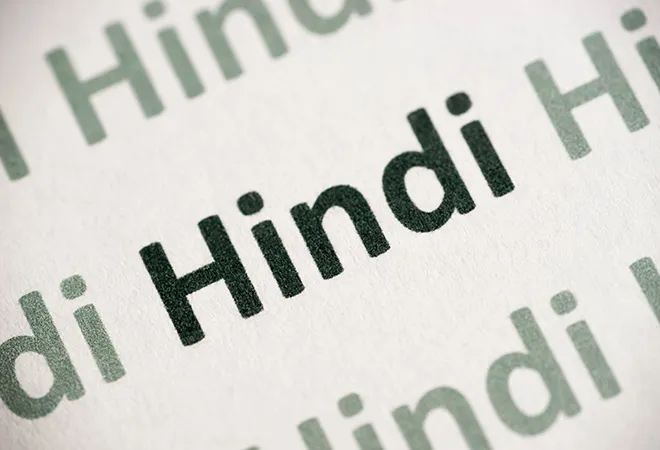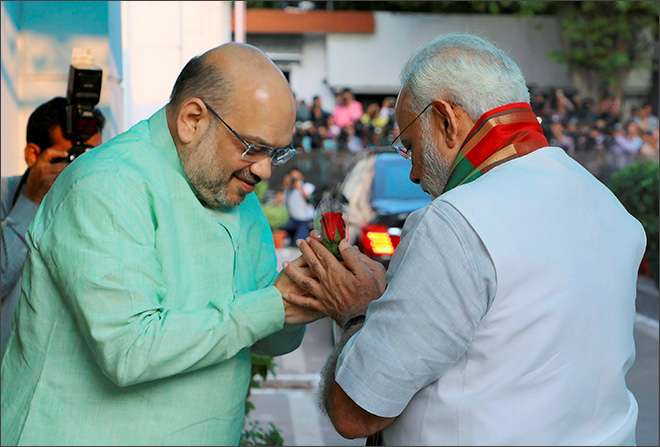
On 27 September, Prime Minister Narendra Modi addressed the 74th United Nations General Assembly in Hindi, underlining its significance at the world stage and also reiterating the longstanding RSS-BJP policy on the national language.
Earlier, a controversy had arisen after Union Home Minister Amit Shah, who is also the ruling party’s most authoritative spokesperson in his capacity of still being the party chief, pushed the case of Hindi to be the national language asserting it was “the heart and soul of the freedom struggle.”
Even while admitting that unity and diversity are the strength of our nation, Shah stressed that a national language is needed so that foreign languages do not overpower our own. The Home Minister took this stance while speaking at a ‘Rajbhasha Award Ceremony’ on Hindi Divas on 14 September 2019 in New Delhi.
The BJP’s stand on the language issue has been very clear for decades.
Notwithstanding Shah’s clarification later that he had never asked for the imposition of Hindi anywhere, but had only advocated its use as the second language — the BJP’s stand on the language issue has been very clear for decades.
“There are several languages in India and they have their own importance, but it is also important for the nation to have one language that is identified globally. Today, if there is one language that can bind the nation, it is Hindi, the most widely-spoken language of the country,” Shah said in a series of tweets.
From next year, Shah said Hindi Divas would be celebrated as a public event. “Divas would be celebrated outside Delhi and for a week,” he stressed adding that the Hindi movement should reach people.
It is relevant to probe why Shah chose to speak on the issue so forcefully when a controversy over Hindi had already arisen in the context of the New Education Policy, the draft of which was prepared by former ISRO chairperson K. Kasturirangan, and was submitted to the government on 31 May this year. The draft had stated that in the non-Hindi speaking states, the three-language policy would include the regional language, Hindi and English. It was vociferously opposed by the southern states, prominently among them was DMK chief M.K. Stalin, who had said that imposing Hindi in Tamil Nadu would be like throwing stones at a beehive.
In those days, Rashtriya Swayamsevak Sangh had pitched for “Hindi, Hindu, Hindustan” and that has been its core Hindutva agenda.
Batting for Hindi is not a new development in the BJP like the scrapping of Article 370, or introduction of a common civil code or construction of a Ramjanmbhoomi temple at Ayodhya. Rather it has been on the party’s agenda almost since its inception, from the days of its erstwhile avatar, Bhartiya Jan Sangh. In those days, Rashtriya Swayamsevak Sangh had pitched for “Hindi, Hindu, Hindustan” and that has been its core Hindutva agenda.
 “Amir Shah’s forceful intervention in favour of Hindi has drawn sharp reactions from parties in southern states.”
“Amir Shah’s forceful intervention in favour of Hindi has drawn sharp reactions from parties in southern states.”
Any push for Hindi that has even a distant or innocuous official sanction in public perception results in fierce opposition as was witnessed in 1937, when Congress government of C. Rajagopalchari in the Madras Presidency planned to impose Hindi on Tamilians, sparking massive protests and anti-Hindi demonstrations led by E.V. Ramaswamy Naicker (Periyar). The Madras government buckled down under the pressure in 1949.
However, the language issue erupted again in 1965, on 26 January, when the day of switching over to Hindi as the sole official language as mandated by the Constitution approached. In the light of this event the anti-Hindi agitation gained momentum in Madras state with increased support from college students. Riots broke out all over the state. To calm the situation, the then Prime Minister Lal Bahadur Shastri had to give the assurance that English would continue to be used as the official language as long as the non-Hindi speaking states wanted it to be so.
For tactical reasons, these issues had been pushed to the background, but the new thrust of it reflects the confidence acquired in the face of party leadership under the Modi-Shah duo strongly backed by the RSS.
With the decline of the one-party domination and role of states gaining importance, the issue of Hindi was pushed back. For tactical reasons, these issues had been pushed to the background, but the new thrust of it reflects the confidence acquired in the face of party leadership under the Modi-Shah duo strongly backed by the RSS, after two successive Lok Sabha victories.
Even earlier, it was Atal Bihari Vajpayee who had addressed the UNGA in Hindi as the External Affairs Minister in the Janata Party government in 1977 and he spoke in the UN seven times in Hindi. Modi has also been speaking at the UN in Hindi since he assumed power in 2014.
As expected, Shah’s forceful intervention in favour of Hindi has drawn sharp reactions from parties in southern states with the Congress cautioning the Modi government against tweaking the three-language formula and asking the ruling party to refrain from stirring controversies on “emotive” issues that had been settled by the Constitution makers. Majority of the opposition leaders expressed serious reservations over Shah’s push for Hindi.
Unity comes from voluntary association and identification of a cause or concept and not by forcefully pushing down a language down the throats of millions of non-Hindi speaking citizens.
In fact, Hindi is spoken by 43.6 percent of the Indian population and by virtue of that it is spoken by the largest number — but that does not empower any government or any leader to impose it on 57.4 percent of non-Hindi speaking citizens. Slowly but surely, Hindi has been spreading and its rate of acceptance has been growing.
One plausible reason for Shah to raise the controversy over Hindi could be to divert the national attention from serious economic crises that the country is facing today.
However, Shah’s call to make Hindi one language to “bind the whole country” is an insidious step to push the “one nation, one religion, one election, one culture, one leader, one party, one language” ideology of the RSS-BJP. In their mistaken understanding of the nation that is as diverse as India, the RSS-BJP is trying to push for uniformity in place of unity. Unity comes from voluntary association and identification of a cause or concept and not by forcefully pushing down a language down the throats of millions of non-Hindi speaking citizens.
By pursuing the politics of non-issues and moving away from real challenges of employment and boosting economic growth at a time when the nation is confronted with economic recession and falling GDP, the Modi government is taking the country to the brink of disaster.
The views expressed above belong to the author(s). ORF research and analyses now available on Telegram! Click here to access our curated content — blogs, longforms and interviews.




 “Amir Shah’s forceful intervention in favour of Hindi has drawn sharp reactions from parties in southern states.”
“Amir Shah’s forceful intervention in favour of Hindi has drawn sharp reactions from parties in southern states.” PREV
PREV


